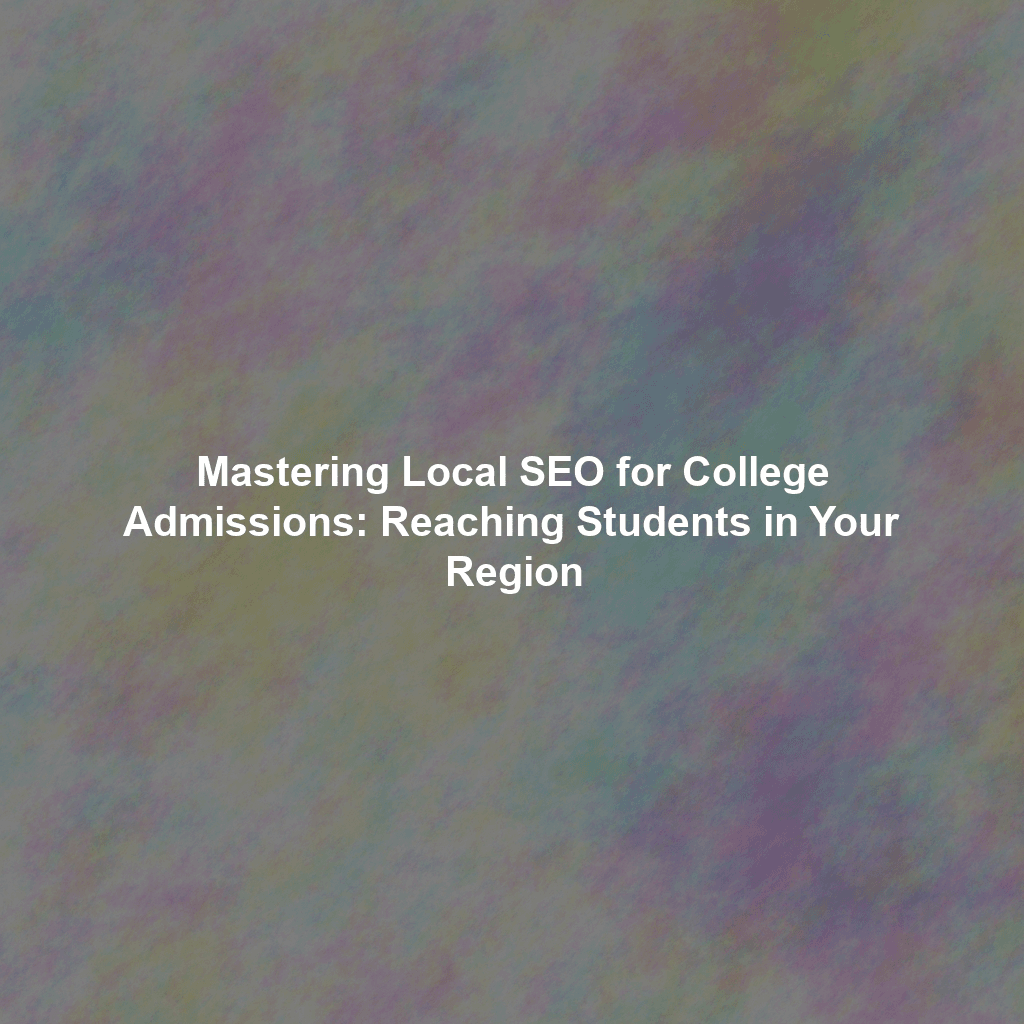In today’s competitive higher education landscape, universities are constantly seeking innovative ways to attract prospective students. While national and international outreach efforts remain crucial, a strong local presence is often overlooked. Focusing on local SEO (Search Engine Optimization) can be a game-changer for colleges and universities, allowing them to connect with students in their immediate geographic area and build a robust regional pipeline.
The Power of Local SEO in College Admissions
Local SEO is all about optimizing your online presence to appear in local search results. Think about it: a high school student in Austin, Texas, searching for “best colleges in Austin” is far more likely to consider institutions that rank highly in those local search results. By mastering local SEO tactics, universities can significantly increase their visibility among prospective students who are actively looking for educational opportunities nearby.
Why Local Students Matter
While attracting students from across the globe adds to a university’s diversity and reputation, focusing on local students offers several advantages:
- Higher Enrollment Rates: Local students are often more likely to enroll due to proximity, familiarity, and existing connections.
- Reduced Recruitment Costs: Targeting a smaller, localized audience can be more cost-effective than nationwide campaigns.
- Stronger Community Ties: A strong local student base fosters stronger relationships with the surrounding community, leading to partnerships, internships, and volunteer opportunities.
- Alumni Engagement: Local alumni are often more engaged and likely to contribute to the university’s success.
Key Local SEO Tactics for Universities
So, how can universities effectively leverage local SEO to attract prospective students? Here’s a breakdown of essential strategies:
1. Google My Business (GMB) Optimization
Your Google My Business profile is your digital storefront in the local search landscape. It’s often the first thing prospective students and their families see when searching for colleges in your area. Therefore, it needs to be comprehensive, accurate, and engaging.
- Claim and Verify Your Listing: Ensure your GMB listing is claimed and verified.
- Complete All Sections: Fill out every section of your profile, including your address, phone number, website URL, business hours, and a detailed description of your university.
- Choose Relevant Categories: Select appropriate categories that accurately reflect your institution (e.g., “College,” “University,” “Private School”).
- High-Quality Photos and Videos: Upload high-resolution photos and videos showcasing your campus, facilities, student life, and academic programs.
- Regularly Post Updates: Share news, events, announcements, and student success stories through GMB posts.
- Actively Respond to Reviews: Acknowledge and respond to both positive and negative reviews promptly and professionally.
2. Local Keyword Targeting
Identifying and targeting relevant local keywords is crucial for attracting the right audience. Think about the terms prospective students might use when searching for colleges in your area.
- Conduct Keyword Research: Use keyword research tools to identify relevant keywords with local intent, such as “colleges in [city name],” “universities near me,” “best nursing programs in [state],” or “[city name] university admissions.”
- Optimize Website Content: Incorporate these keywords naturally into your website content, including page titles, meta descriptions, headings, and body text.
- Create Location Pages: Develop dedicated location pages for each campus or department, if applicable, targeting specific local keywords.
- Blog About Local Topics: Create blog posts about topics relevant to local students, such as local events, community initiatives, or student life in your city.
3. Community Engagement
Building relationships with the local community can significantly boost your local SEO efforts and enhance your reputation.
- Participate in Local Events: Sponsor or participate in local events, such as high school college fairs, community festivals, and charity events.
- Partner with Local Businesses: Collaborate with local businesses to offer discounts, internships, or volunteer opportunities for students.
- Engage on Social Media: Use social media to connect with local residents, share local news, and promote local events.
- Offer Community Programs: Host workshops, seminars, or community events on campus to attract local residents and build goodwill.
4. Local Citations
Local citations are online mentions of your university’s name, address, and phone number (NAP) on other websites. These citations help search engines verify your business’s legitimacy and improve your local rankings.
- Submit to Local Directories: List your university in relevant local directories, such as Yelp, Yellow Pages, and local business directories.
- Ensure Consistency: Ensure your NAP information is consistent across all online platforms. Inconsistencies can confuse search engines and negatively impact your rankings.
- Focus on Quality Citations: Prioritize listings on reputable and authoritative websites.
5. Reviews and Reputation Management
Online reviews play a significant role in shaping prospective students’ perceptions of your university. Encourage students, alumni, and faculty to leave reviews on platforms like Google, Yelp, and Niche.
- Encourage Reviews: Make it easy for people to leave reviews by providing links to your GMB profile and other review platforms.
- Respond to Reviews: Respond to both positive and negative reviews promptly and professionally. Thank reviewers for their positive feedback and address any concerns raised in negative reviews.
- Monitor Your Online Reputation: Regularly monitor online reviews and social media mentions to identify and address any negative feedback.
Measuring Your Local SEO Success
It’s crucial to track your local SEO performance to understand what’s working and what needs improvement.
- Track Keyword Rankings: Monitor your rankings for relevant local keywords.
- Monitor Website Traffic: Analyze website traffic from local search results.
- Track GMB Performance: Monitor GMB metrics, such as views, clicks, and calls.
- Analyze Conversion Rates: Track conversion rates for local leads, such as applications and campus visits.
Conclusion
In conclusion, mastering local SEO is essential for colleges and universities looking to attract prospective students within their geographic area. By optimizing your Google My Business profile, targeting local keywords, engaging with the community, building local citations, and managing your online reputation, you can significantly improve your visibility in local search results and build a strong regional pipeline of qualified applicants. Investing in local SEO is an investment in your university’s long-term success and its connection to the community it serves. Embrace these strategies and watch your local student enrollment flourish.
 Skip to content
Skip to content

